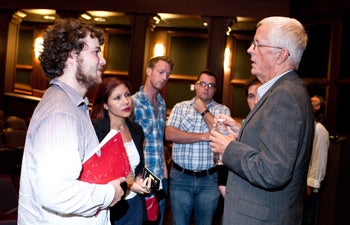A Director to Look ‘Up’ To
For the past 47 years, director Michael Apted has navigated the rough waters of documenting real voices.
Unlike actors in feature films, the people in Apted’s Up series don’t rely on scripts or take direction from him. They determine how much of their lives are revealed and can ask the director to stop filming.
“This sort of work has its own challenges,” said Apted, past president of the Directors Guild of America, who also directed the James Bond film The World is not Enough (1999)and Coal Miner’s Daughter (1980), which earned seven Academy Award nominations, winning best actress for Sissy Spacek.
Beginning in 1964, the Up series has followed the lives of 12 British children since age 7.
“I don’t think there are many shows that have given so much time to ordinary people with ordinary lives,” said Apted, who has won several British Academy awards.
Apted spoke at the Ray Stark Family Theatre on the University Park campus Oct. 9 as part of the USC Shoah Foundation Institute’s Student Voices Master Class, two days of workshops and discussions meant to teach USC graduates and undergraduates how to use testimonials in filmmaking. Organized by the institute housed in USC Dornsife and funded by HBO, the second session takes place Oct. 16.
The master class shows participants how to use the institute’s Visual History Archive, which contains nearly 52,000 video testimonies of Holocaust survivors and other witnesses. Representing 56 countries in 32 languages, the archive is the largest of its kind in the world.
Beginning Oct. 9, panels explore the complexity of incorporating real-life stories of survival to construct novel narratives. The sessions also provide hands-on training sessions on cinematography, recording interviews and post-production techniques.
Discussions include “Speaking about Genocide: The Ethical Use of New and Traditional Media,” with USC School of Cinematic Arts professors Steve Anderson, Michal Renov and Holly Willis; and “Documentary Filmmaking and Testimonies: Conscientious Juxtaposition, Association and Metaphor,” with filmmakers June Beallor, Ted Braun, Mark Harris, James Moll and Deborah Oppenheimer.

Michael Apted talks with students during the USC Shoah Foundation Institute’s Student Voices Master Class. Photo by Kim Fox.
During Apted’s address, the director talked about his Up series, which examines the British class system and social inequalities. Renov, professor of critical studies and associate dean for academic affairs in the USC School of Cinematic Arts, moderated the discussion.
“We couldn’t think of someone who had a greater and longer experience in the promises and challenges of working with real people than Michael Apted,” Renov said.
“The institute is honored to have such an accomplished filmmaker as Michael Apted deliver the keynote address, and we are grateful to HBO for making this learning opportunity possible,” said Stephen Smith, USC Shoah Foundation Institute executive director. “Among other things, the master class provides training on the use of the Visual History Archive and prepares students to think critically about the ethical responsibilities involved in using genocide survivor testimony for film projects.”
During his address, Apted shared some of his work to emphasize that everything isn’t always smooth sailing.
In clips from Up, Apted showed how one of his more outspoken participants, Jackie, became angry when he asked if she was concerned that she saw much of herself in her son. Jackie also told the director she was insulted by his question about whether she had dated enough men before marrying. She was so upset with the latter question she asked him to stop filming.
Apted said the incident emphasized the importance of respecting his subjects’ boundaries.
“If they don’t want to talk about a particular subject then we don’t talk about it because they obviously don’t want to air this stuff,” he said. “If I annoy them or upset them or lie to them or break my trust with them then they’re gone and never come back.”
He also showed unused footage of another subject, Neil, who told Apted he misrepresented him by focusing on Neil’s work in politics rather than telling the story of his aspirations to become a writer.
During her segment, Jackie raised some of the same concerns.
“You will edit this program as you see fit. I have no control over that,” she said in the clip. “You definitely come across as this is your idea of what you want to do and how you see us, and that’s how you will portray us.”
The confrontations led Apted to do some reflecting. He listened to the complaints and reviewed past footage. He plans to include previously omitted material in subsequent episodes.
“Every cut is a judgment call,” Apted said. “It is a sense of judgment of the director’s morality in the way he or she edits the film.
“You hope that your perception is accurate.”